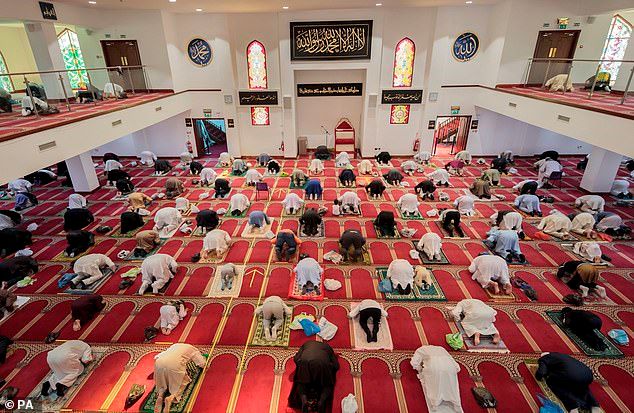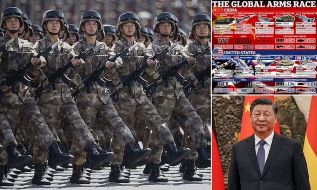Muslim Indonesia Menjalani Bulan Ramadhan dengan `Social Distancing`
Muslims Begin Marking Ramadan with Socially Distanced Prayers
Editor : Kemal A Praghotsa
Translator : Novita Cahyadi

UMAT Muslim mulai menandai Ramadhan dengan sholat berjamaah yang kontras dengan thaun lalu ketika bulan suci islam bertepatan dengan dimulainya pandemi virus corona.
Kasus Covid-19 meningkat di Indonesia, negara berpenduduk Muslim terbesar di dunia, tetapi program vaksinasi sedang berlangsung dan pemerintah melonggarkan pembatasan sosial.
Masjid diizinkan buka untuk sholat Ramadhan dengan protokol kesehatan yang ketat, dan pusat perbelanjaan dan kafe dibuka. Orang yang sedang lewat dapat melihat lagi tirai-tirai yang melindungi pemandangan makanan dari orang-orang yang berpuasa.
Menteri Urusan Agama Indonesia, Yaqut Cholil Qoumas mengumumkan dalam pidato yang disiarkan televisi pada Senin malam bahwa bulan ramadhan telah terlihat.
Bulan suci ditandai dengan doa yang intens, puasa subuh hingga senja dan pesta malam.
Tahun lalu, pihak berwenang menutup semua masjid dan ulama mengeluarkan fatwa, atau dekrit, yang mendesak umat Islam untuk sholat di rumah selama bulan suci daripada berkumpul di ruang ramai dan berisiko menyebarkan virus.
Imam masjid agung Istiqlal Jakarta, Nasarudin Umar mengatakan umat Muslim tahun ini mengharapkan kebangkitan virus tetapi semua masjid akan terus mematuhi jarak sosial dan tindakan pencegahan lainnya, yang secara signifikan akan mengurangi kerumunan.
“Saya sudah merindukan semua Ramadan,” katanya.
“Hati umat Muslim yang setia terikat pada masjid… kerinduan pada pecinta Ramadhan akhirnya terobati hari ini meskipun pandemi belum berakhir.” katanya.
Anies Baswedan selaku Gubernur DKI Jakarta mengatakan bahwa masjid di ibu kota jakarta mendisinfeksi 317 masjid pada hari Minggu kemarin.
Penanda jarak sosial telah dipasang dan sabun serta pembersih tangan telah disiapkan.
Pemerintah juga akan mengizinkan orang mengadakan pertemuan "buka puasa" selama Ramadhan di restoran, pusat perbelanjaan dan kafe, yang dapat melayani pelanggan hingga 50% dari kapasitas mereka dan mengikuti pedoman kesehatan yang ketat.
Iftar terjadi saat matahari terbenam, waktu umat Islam berbuka puasa dan biasanya merupakan waktu utama bagi orang-orang untuk makan malam bersama dengan teman dan anggota keluarga sebelum shalat malam.
“Melonggarkan pembatasan itu seperti menghirup udara segar bagi kita yang lelah dengan wabah Covid-19 ini,” kata salah satu warga Jakarta, Anna Mardyastuti seperti dikutip PA Media yang dilansir MailOnline.
“Ya, mereka harus bertindak untuk menghentikan virus, tetapi tidak memblokir pintu untuk beribadah atau mengubah tradisi Ramadhan kita sepenuhnya,” katanya.
MUSLIMS have begun marking Ramadan with communal prayers in a socially distanced contrast to the empty mosques of a year ago when Islam’s holiest month coincided with the start of the coronavirus pandemic.
Covid-19 cases are spiking in Indonesia, the world’s most populous Muslim nation, but vaccines are being administered and the government is loosening restrictions.
Mosques were allowed to open for Ramadan prayers with strict health protocols in place, and with shopping centres and cafes open, passers-by could again see curtains shielding the sight of food from people fasting.
Neighbouring Muslim-majority Malaysia also eased its restrictions, including last year’s ban on “taraweeh” night-time prayers and allowing popular open-air bazaars selling food, drinks and clothes to open.
Indonesia’s religious affairs minister Yaqut Cholil Qoumas announced in a televised address on Monday evening that the new Ramadan moon had been spotted.
The holy month is marked by intense prayer, dawn-to-dusk fasting and nightly feasts.
Last year, authorities shuttered all mosques and clerics issued a fatwa, or edict, urging Muslims to pray at home over the holy month rather than congregate in crowded spaces and risk spreading the virus.
Muslims this year are expecting a virus resurgence but all mosques will be continuing to adhere to social distancing and other precautions, which will significantly reduce crowds, said Nasaruddin Umar, imam of Jakarta’s Istiqlal grand mosque.
“I miss everything of Ramadan already,” Umar said.
“The heart of faithful Muslims is tied to the mosque… the longing for Ramadan lovers has finally been relieved today although the pandemic has not yet ended.”
In the capital Jakarta, authorities disinfected 317 mosques on Sunday in preparation for Ramadan, said governor Anies Baswedan.
Social distancing markers have been installed and soap and hand sanitisers have been prepared.
The government will also allow people to hold “iftar” gatherings during Ramadan in restaurants, shopping centres and cafes, which can serve customers up to 50% of their capacity and follow strict health guidelines.
Iftar occurs at sunset, the time Muslims break their fast and usually the prime time for people to have dinner together with friends and family members before the night prayer.
“Easing restrictions is like a breath of fresh air for us who are tired by this Covid-19 outbreak,” said Anna Mardyastuti, a resident in Jakarta.
“Yes, they should act to stop the virus, but not block the door to worship or to change our tradition of Ramadan entirely,” she said.
In Malaysia, Wan Noradriana Balqis, 21, welcomed the return of community prayers in mosques but said she will avoid Ramadan bazaars that are often packed with people.
“I don´t think it’s a good idea to reopen the bazaars. The rules are there but many people don’t follow them,” the database administrative officer said.
Malaysia’s coronavirus cases have more than tripled since January to more than 362,000, with daily increases exceeding 1,000.
Indonesia is the worst-hit country in South East Asia, with more than 1.5 million infections as of Monday and over 42,600 deaths.
Indonesia will maintain its vaccine rollout through Ramadan as officials tried to ease worries over the Islamic teaching that Muslims should refrain “from anything entering the body” between sunrise and sunset.
Indonesia’s top Muslim clerical body said Muslims eligible for vaccinations are not only allowed but “required” to get them during Ramadan.
Although Muslims abstain from all food and drink in daylight hours during Ramadan, the vaccine enters muscle rather than the bloodstream and is not nutrition, so it does not invalidate fasting, said Asrorun Niam Sholeh, the head of fatwas for the Indonesian Ulema Council.
“If we carry on taking our vaccines, we can ensure that next Ramadan we do return to some normality,” Sholeh said.
Some vaccine sites in Jakarta are extending their opening hours so Muslims can come after they have broken their fast.
Indonesia plans to vaccinate two-thirds of its population of about 270 million people – or just over 180 million people – by the end of next year.
The current priorities are healthcare workers, elderly and other at-risk populations, and the two-dose vaccine will be free for all Indonesians.
In India, which is experiencing an explosive spread of the virus, Muslim scholars are appealing to their communities to strictly follow anti-virus protocols and refrain from organising large gatherings.
Ramadan prayers begin on Tuesday night and fasting begins on Wednesday in the country with 200 million Muslims.
Many Indian cities dealing with major virus surges have imposed night curfews, and it remains unclear whether the faithful will be allowed to offer Tarawih, the long post-Iftar congregational prayers in mosques that sometimes stretch late into the night.
Muslims in Indian-controlled Kashmir are still suffering from the two back-to-back lockdowns that left tens of thousands without any means to earn their livelihoods.
The disputed region, the only part of the Hindu-dominated country that is majority Muslim, was under an unprecedented military lockdown in 2019 for months before the months-long coronavirus lockdown last year.
Local charities, like last year, have planned to distribute Ramadan ration kits for needy and destitute families.















